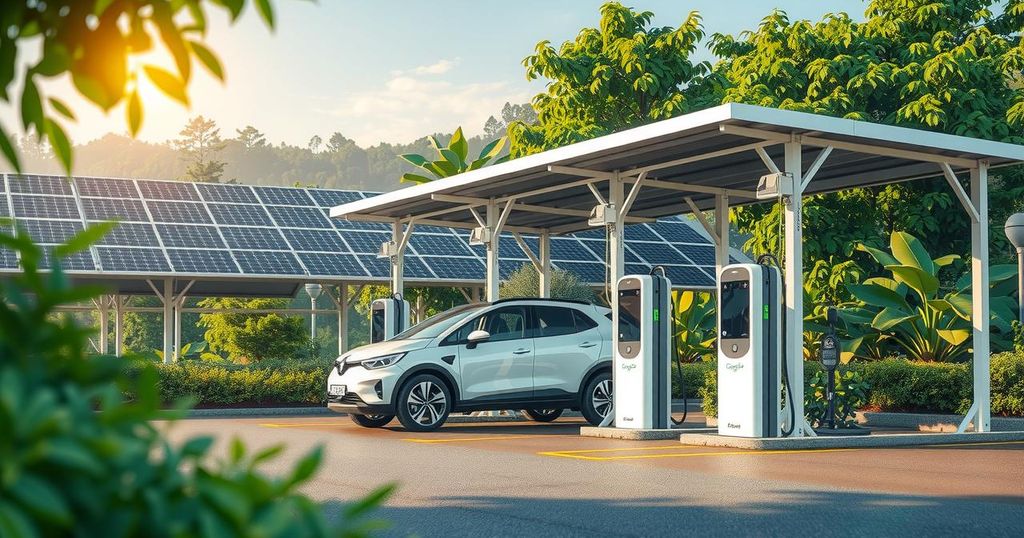Rwanda’s Carbon Market Initiative: A Leap Towards Electric Vehicle Adoption

Rwanda is initiating a Rwf1.2 billion carbon market project to enhance electric vehicle adoption. Funded by GGGI and in collaboration with REMA, the project seeks to build capacity among stakeholders and develop carbon reduction initiatives across sectors. The country’s EV market anticipates requiring $900 million for adoption and infrastructure by 2030, with efforts underway to tackle challenges such as insufficient charging stations.
Rwanda’s government is launching a Rwf1.2 billion initiative to operationalize a carbon market, aiming to boost awareness and build capacity within both public and private sectors. Electric vehicle (EV) dealers anticipate that this project, named the Rwanda Article 6 Readiness and Carbon Market Framework Operationalisation, will enhance electric vehicle adoption in the nation. Funded by the Global Green Growth Institute (GGGI) Carbon Transaction Facility, the initiative will be executed over two years in partnership with the Rwanda Environment Management Authority (REMA).
This project will offer technical support to develop high-quality carbon reduction initiatives across various sectors, including agriculture, forestry, energy, transport, and waste management. REA has pinpointed renewable energy efforts, such as the promotion of electric vehicles, as highly promising in the carbon market domain. These projects are expected to present valuable capacity-building prospects for identifying and designing new initiatives. A carbon market allows for the buying and selling of carbon credits, which represent one tonne of reduced carbon emissions, allowing businesses to offset their emissions through funding projects that mitigate greenhouse gases.
The full-scale adoption of electric vehicles and related infrastructure in Rwanda is projected to necessitate approximately $900 million in funding by 2030. Investors engaging in EV initiatives may take advantage of financial incentives based on the emissions reduced and sold on the carbon market each year. This framework is viewed as a pivotal move towards encouraging private sector involvement in establishing a carbon-neutral economy. Srinivas Cheruvu, Managing Director of CFAO Mobility Rwanda, highlighted the sustainability benefits of electric vehicles compared to traditional fossil fuel-powered vehicles.
Cheruvu elaborated on the economic advantages of EVs, noting that models like the BYD Dolphin, equipped with a 44.8 KWH battery, allow a round trip from Kigali to Rubavu (340 km) at a mere Rwf11,000 charging cost versus Rwf57,000 in fuel expenses. Additionally, the range of certain models reaches 520 km and 420 km per charge, affirming their efficiency. These vehicles also come equipped with mobile chargers that can be used conveniently at home. Cheruvu further asserted that Rwanda’s commitment to green growth policies positions its electric vehicle market for significant growth potential.
Regarding tax incentives, Cheruvu remarked that the government’s tax exemption policy significantly bolsters electric vehicle adoption. He expressed anticipation for additional initiatives that will facilitate sector expansion, though challenges like long charging times persist due to insufficient public charging infrastructure. Teddy Mugabo, CEO of the Rwanda Green Fund, mentioned that the fund is financing various e-mobility companies to help expand the EV infrastructure, particularly in charging stations.
Faustin Munyazikwiye, Deputy Director General of REMA, underscored the importance of renewable energy projects, such as electric vehicles, within Rwanda’s carbon market strategy. Apart from the support from GGGI’s Carbon Transaction Facility, partnerships with Singapore and Sweden have been established to enhance project design and capacity-building, which will further mobilize funding for renewable energy projects. Rwanda seeks to facilitate carbon credit trading through agreements with Singapore, Sweden, and Kuwait under Article 6 of the Paris Agreement, aiming to assist these countries in achieving their climate goals.
At COP28 in December 2023, Rwanda unveiled its National Carbon Market Framework, designed to utilize market mechanisms to reduce greenhouse gas emissions effectively. This framework sets clear guidelines for carbon credit trading and encourages businesses to adopt sustainable technologies. Although the initiative has encountered delays due to awareness and capacity limitations, REMA is focused on resolving these issues to enhance the operational transparency and effectiveness of the carbon market.
By establishing this market, Rwanda aims to attract international investments, promote sustainable development, and contribute to global efforts in mitigating climate change. Caroline Raes, GGGI Country Representative in Rwanda, emphasized the necessity for equitable participation in carbon markets to facilitate investment in emissions reduction projects, which will ultimately enhance Rwanda’s readiness for international carbon markets, unlocking considerable financial resources to stimulate climate action and foster the transfer of green technologies.
Rwanda’s Rwf1.2 billion carbon market initiative represents a significant step towards enhancing electric vehicle adoption and sustainability within the nation. The partnership between government agencies and private stakeholders aims to foster awareness and capacity-building in this sector. With projected financial requirements of $900 million for EV infrastructure by 2030 and support from international partnerships, Rwanda is poised for growth in green technologies. The carbon market framework is a strategic initiative that promotes private sector involvement while contributing to global climate mitigation efforts.
Original Source: www.newtimes.co.rw





